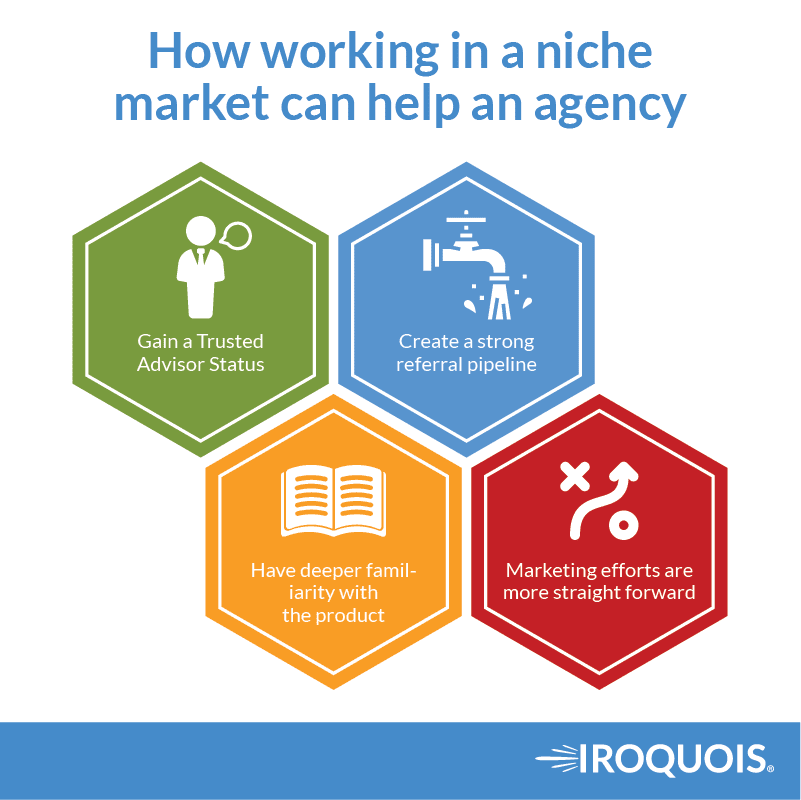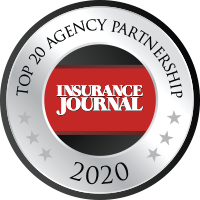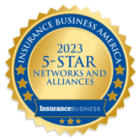In this episode of The Trusted Advisor, Todd Whiteman form Enscoe Long Insurance shares with us why targeting niche markets has been profitable for his agency. Enscoe Long is a proud Iroquois Member and attributes some of their niche industry success to the access Iroquois has provided to specialized carriers. With great relationships come great referrals and a profitable business model.
Edwin K. Morris (3s):
Welcome to the trusted advisor podcast brought to you by Iroquois Group. Iroquois is your trusted advisor in all things insurance. I am Edwin K Morris. Todd Whiteman is the executive vice president of Enscoe Long Insurance group. With 23 years of experience in insurance and risk management, he provides programs and consulting to both for-profit and non-for-profit organizations across Pennsylvania. Todd is an active member in the local community and serves multiple board positions. He also volunteers countless hours of work with various local nonprofits. Todd, what brought you into the nonprofit sector?
Todd Whiteman (43s):
I spent a number of years when I was younger as a volunteer for the number of organizations, including the Boy Scouts, really got a good taste for what it was like to help other people. When I looked at all the Industry options that might be facing me from a niche standpoint, it, it, it was a, no-brainer to work with a nonprofit organization.
Edwin K. Morris (1m 3s):
So did non-profit work start before the Insurance work?
Todd Whiteman (1m 6s):
It sure did. I spent a number of years doing that before I started working for my father at an agency that he owned. So it was just an easy transition for me.
Edwin K. Morris (1m 16s):
Sounds like it fits both your mission in your, your service orientation, but what brought you the expertise in this field in the insurance world?
Todd Whiteman (1m 26s):
I think just like anything. It was spending a lot of time getting to know all the different individuals, organizations, really understanding how they operate and how they work, joining in a number of different associations, reading up in periodicals in that sector, and really get an understanding of how they operate, as they are quite different from our standard for-profit clients,
Edwin K. Morris (1m 50s):
You have got the insider view, right? Just all your world experience in being a participant and engaging with a nonprofit world.
Todd Whiteman (1m 59s):
Absolutely. I spent about five years as a board member for both the association of fundraising professionals and the Pittsburgh Planned Giving Council, so I was a member, I joined their board, really got to know the leaders in the industry, but again, that inside knowledge of how everything works, all of those relationships and, and really being able to pick the brain of nonprofit executives to know where the issues lied and, and what kept them up at night.
Edwin K. Morris (2m 26s):
So knowing all of that, I’m sure you created a quick checklist of, of how to market to these folks.
Todd Whiteman (2m 32s):
No doubt. You know, I think that relationship is key as it is with so many different businesses, but in that sector especially, those same individuals will just move from an organization to organization. So once you knew what they needed, how they worked, each organization might have its own nuances, but still the needs of the individuals stayed at the same.
Edwin K. Morris (2m 52s):
So any major differences in non-for-profit versus for profit?
Todd Whiteman (2m 58s):
Yeah, there are certainly are. The, the biggest one from our industry standpoint is a decision-maker. So we are certainly used to calling and talking to somebody that’s either in HR or finance or may be the owner of a business. And that’s your decision-maker. But in the nonprofit sector, there are a number of different layers and levels that you have to work through from finance into the board, the different committees that each board has a and then ultimately presenting to the president of the board, executive director of finance and HR, a number of different individuals. They do it a little bit differently. So instead of just that one main point of contact, I find myself often working with four or five different individuals at a large nonprofit, you certainly have to figure out who to talk to, how to get through to them, what their individual needs are and to make sure that you can satisfy multiple people.
Edwin K. Morris (3m 49s):
Once you’re ingrained in that, I would assume the referrals have to be pretty regular.
Todd Whiteman (3m 57s):
It’s just like, I think in any industry, you know, somebody specializes in any one segment, you’re going to get to know the same group of people, but those referrals – that is a specialty key to this industry, they rely heavily on their peers, where a lot of for-profit companies, they’re competitors and they look at each other as competitors and don’t always share knowledge or assistance and certainly share those that are going to partner with them and work with them. But in the nonprofit sector, that is almost a guarantee that they’re going to ask for that help. I would venture to guess at this point, now it took a number of years to get there, about 16 years of specializing in this industry, but over the last 10 years, almost all of our business in this sector has come from referrals.
Edwin K. Morris (4m 40s):
What would you recommend it to a new producer in the industry that is looking into this non-profit work?
Todd Whiteman (4m 46s):
So somebody who has the passion for any industry, and certainly this is a non profit sector, that will certainly go a long way. Having that passion, having that care for what you are doing, really shines through to the client. As somebody who has a passion for the automobile industry, then going into some type of niche there certainly would make sense for me. This was practicing what I preach as a board member for a number of organizations, as a volunteer or as a coach in the sporting realm, which is just one more aspect of nonprofit, all of the, all the sports teams. It all came easy and it made it easy to talk the talk and walk the walk. So I think anybody looking at a niche has to really care about what they’re doing first and foremost.
Todd Whiteman (5m 29s):
And if you have a passion that would have been towards the non-profit sector of that, then certainly look into that opportunity.
Edwin K. Morris (5m 36s):
It provides an element of authenticity. I think that really is hard to beat.
Todd Whiteman (5m 43s):
No doubt. They, they can tell very quickly that you care about the mission. I always look at it and I told my clients the same, but you know, I’m a part of their team. At this point, I am just another volunteer. I might get paid a commission to do the work I do, but we’re actively out there. So I’m meeting with their board, I’m going to their gala, to their golf outings. So there are different functions and I’m supporting, and they can see that. So if they know you’re just there for the dollar, you know, it’s a sale, they’re really not to be interested. When you can show that you really understand the work that they’re doing, why those that they serve matter, again, that that passion just comes through and really puts you on a level playing field,
Edwin K. Morris (6m 23s):
What you’re really speaking to is a level of investment on your part. When you come in with that knowledge that you’ve already gained through your own personal experience, how does that leverage to find the specific carriers that cater towards this niche?
Todd Whiteman (6m 39s):
Having the understanding, having that background, when we talk to our carriers, they really understand the work that we do. They know as well, that it is a passion, it’s not just about the business aspect. So as I’ve gone out there over the years, over the last 16 or 17 years, and working with our characters and finding the right Partners, they can tell very quickly that we understand what we’re doing. So we know that industry and, and it could be a, to be on the screen. There are some coverages, some exposure, some things – there might be some things that most carriers do not want to get involved in. So for the ones that we’ll offer those coverages, they really want to know that we know what we’re talking about, we understand the client’s needs and that we can show them what those issues might be and find ways around them, find solutions to problems our clients have versus just selling them Insurance.
Todd Whiteman (7m 27s):
So without a doubt, the carriers, understand that they have that expertise. And for a number of them, they will only contract with agencies that do have this specialization. They will not be in every shop. And that gives us a leg up then in competition.
Edwin K. Morris (7m 41s):
What’s the benefit to Enscoe Long of the relationship that Iroquois brings?
Todd Whiteman (7m 44s):
With that relationship, there certainly came some different carriers we wouldn’t have access to that specialize in this industry. Also with that came knowledge from different underwriters or the other team leaders that we may not have had access to in the past, the conversations around those really difficult risks, how to get around any issues that might be presented. And I think Iroquois, it gives us the larger voice and, and one thing that we really do enjoy as I have reached out to Iroquois over the years and asked for assistance, finding maybe in different States, somewhere were not licensed. Some that might have a program that I need to get access to for a client and vice versa. We’ve been on the other end of that over time where we’re helping other Iroquois agents place business refine solutions for their nonprofit clients when they simply can’t.
Edwin K. Morris (8m 31s):
As an industry participant in the world of non-profit, what’s the biggest challenge right now, as you see it?
Todd Whiteman (8m 36s):
Yes. So right now we’re seeing significant rate increase, but that really seems to be, to negatively affect the nonprofits a bit more. Now they’re seeing rate increases in abuse and molestation, which is a key part of their coverage. When I think about my boy Scouts and girl Scouts, not wanting to see things with that, like those rate increases are significant, same with the reduction in coverage, making things a little more difficult for us to put in place for our clients needs. And then also on the director’s and officer’s employment practices side, we are seeing significant rate increase there as well. And that’s a huge exposure. Just because we provide to, you know, to a, for profit entities, when we have a client that actually will agree and put that coverage in place for a non-profit, they can’t exist without it.
Todd Whiteman (9m 22s):
Now that is worth being done by the volunteer board who are putting their assets out on the line so that we meet the coverage. Ah, and they don’t always have the training or the resources and everything behind them. So when those directors and officers claims come up, they don’t have the expertise from an employment practices standpoint, the same thing goes, they just don’t always have the expertise. So they lean heavily on us to get the job done. But when we see those rate increases in the industry, they seem to hit that segment even worse.
Edwin K. Morris (9m 52s):
Well, with the customer relationship you’ve just described of what you’re able to provide in, especially with a, as you said, a lot of volunteers that may not have the expertise and they rely heavily upon someone to guide them because legally they’re responsible for that organization.
Todd Whiteman (10m 11s):
Yeah. And that’s one of the things we love. So nothing against our for-profit clients, of course, we love those relationships, but they don’t ask a lot. So they don’t reach out, they have an attorney to call. They’ll have other business colleagues to call. When, when the nonprofit calls, they need help with everything. Sometimes it’s one executive director with every single job. And she doesn’t know how to do, she or he doesn’t know how to do any of them a hundred percent. They are wearing multiple hats. So anywhere we can help, we just, we enjoy that relationship of being needed and providing a service, which is what we’re there to do anyway. Yeah.
Edwin K. Morris (10m 46s):
And it sounds like you’re a real bridgemaker for those folks. So to wrap things up, what other service or segment does Enscoe Long target?
Todd Whiteman (10m 57s):
So a number of years ago, and recognizing the growth we’ve had in this segment and how well we’ve done with this niche, we formed the same type of niche in the grocery and retail food segment. We have another producer and owner of the agency who had a background in that industry before coming to us. So really tapping into his network and his knowledge, his understanding of how grocery stores and, and food producers, and the like work. We’ve seen significant success in that. Well, over a hundred different clients now in that realm as well. So we, we look for our next one. We have found that this is a great way to bring a new producer on and give them expertise and give them a built-in network.
Todd Whiteman (11m 42s):
Once they can build those relationships. It’s a win-win,
Edwin K. Morris (11m 47s):
Whatever is designed in a win-win is a win for me also. So thank you very much for stopping on the road today to share your knowledge.
Todd Whiteman (11m 56s):
Absolutely. I appreciate the opportunity and, and the partnership
Edwin K. Morris (12m 1s):
Thanks for listening to this edition of the trusted advisor podcast brought to you by Iroquois Group. Iroquois, your trusted advisor for all things insurance, and remember: get out of the office and sell. I am Edwin K Morris, and I invite you to join me for the next edition of the trusted adviser podcast.



